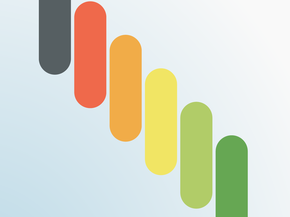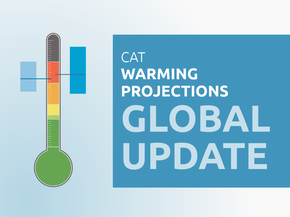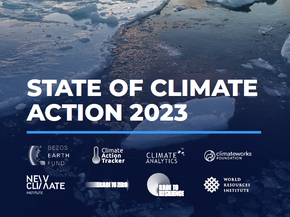Critically Insufficient4°C+
World
NDCs with this rating fall well outside of a country’s “fair share” range and are not at all consistent with holding warming to below 2°C let alone with the Paris Agreement’s stronger 1.5°C limit. If all government NDCs were in this range, warming would exceed 4°C. For sectors, the rating indicates that the target is consistent with warming of greater than 4°C if all other sectors were to follow the same approach.
Highly insufficient< 4°C
World
NDCs with this rating fall outside of a country’s “fair share” range and are not at all consistent with holding warming to below 2°C let alone with the Paris Agreement’s stronger 1.5°C limit. If all government NDCs were in this range, warming would reach between 3°C and 4°C. For sectors, the rating indicates that the target is consistent with warming between 3°C and 4°C if all other sectors were to follow the same approach.
Insufficient< 3°C
World
NDCs with this rating are in the least stringent part of a country’s “fair share” range and not consistent with holding warming below 2°C let alone with the Paris Agreement’s stronger 1.5°C limit. If all government NDCs were in this range, warming would reach over 2°C and up to 3°C. For sectors, the rating indicates that the target is consistent with warming over 2°C and up to 3°C if all other sectors were to follow the same approach.
2°C Compatible< 2°C
World
NDCs with this rating are consistent with the 2009 Copenhagen 2°C goal and therefore fall within a country’s “fair share” range, but are not fully consistent with the Paris Agreement long term temperature goal. If all government NDCs were in this range, warming could be held below, but not well below, 2°C and still be too high to be consistent with the Paris Agreement 1.5°C limit. For sectors, the rating indicates that the target is consistent with holding warming below, but not well below, 2°C if all other sectors were to follow the same approach.
1.5°C Paris Agreement Compatible< 1.5°C
World
This rating indicates that a government’s NDCs in the most stringent part of its “fair share” range: it is consistent with the Paris Agreement’s 1.5°C limit. For sectors, the rating indicates that the target is consistent with the Paris Agreement’s 1.5°C limit.
Role model<< 1.5°C
World
This rating indicates that a government’s NDC is more ambitious than what is considered a “fair” contribution: it is more than consistent with the Paris Agreement’s 1.5°C limit. No “role model” rating has been developed for the sectors.
1.5°C Compatible< 1.5°C
World
This rating indicates that a government’s NDCs in the most stringent part of its “fair share” range: it is consistent with the Paris Agreement’s 1.5°C limit. For sectors, the rating indicates that the target is consistent with the Paris Agreement’s 1.5°C limit.
Sources
References
- BEIS (2021) UK enshrines new target in law to slash emissions by 78% by 2035, UK Government. Available at: https://www.gov.uk/government/news/uk-enshrines-new-target-in-law-to-slash-emissions-by-78-by-2035 (Accessed: 7 July 2021).
- Bogaisky, J. (2020) ‘U.S. Airlines On Track To Get What They Wanted In Coronavirus Bailout Bill, Without Environmental Restrictions’, Forbes, 25 March. Available at: https://www.forbes.com/sites/jeremybogaisky/2020/03/25/us-airlines-on-track-to-get-what-they-wanted-in-senate-bailout-bill-without-environmental-restrictions/?sh=2c73ef4f70ad.
- Brazil (2019) ‘Statement of the Permanent Delegation of Brazil to the International Civil Aviation Organization. Verbal Note No.: 2019-082 / BRASICAO’. Available at: https://www.icao.int/Meetings/a40/Documents/Resolutions/Brazil_EN.pdf.
- Burkhardt, U., Bock, L. and Bier, A. (2018) ‘Mitigating the contrail cirrus climate impact by reducing aircraft soot number emissions’, Climate and Atmospheric Science, pp. 1–37. doi: 10.1038/s41612-018-0046-4.
- CAEP (2021) ‘Update to Scenario Based Analyses of Potential Impacts of Covid19 on CORSIA’. Montr: ICAO. Available at: https://www.icao.int/environmental-protection/CORSIA/Documents/CAEP_Update COVID-19 impact analyses.pdf.
- CE Delft (2019) Taxes in the Field of Aviation and their impact - Final report. doi: 10.2832/913591.
- China (2019) ‘Statement of the Chinese Delegation on the “Consolidated Statement of Continuing ICAO Policies and Practices Related to Environmental Protection - Climate Change” and the ’Consolidated Statement of Continuing ICAO Policies and Practices Related to Environ’. Available at: https://www.icao.int/Meetings/a40/Documents/Resolutions/china_EN.pdf.
- Climate Action Tracker (2020) Global update: Pandemic recovery with just a hint of green. Available at: https://climateactiontracker.org/publications/global-update-pandemic-recovery-with-just-a-hint-of-green/.
- Czerny, A. I. et al. (2021) ‘Post pandemic aviation market recovery: Experience and lessons from China’, Journal of Air Transport Management, 90, p. 101971. doi: 10.1016/j.jairtraman.2020.101971.
- Ecosystem Marketplace (2020) Carbon markets are well-positioned to meet CORSIA demand projections. Available at: https://www.forest-trends.org/pressroom/ecosystem-marketplace-forecasts-ample-supply-of-corsia-carbon-credits-if-icao-council-limits-eligibility-to-post-2016-offsets/.
- EDF (2019) ICAO’s market-based measure. Available at: https://www.edf.org/climate/icaos-market-based-measure.
- Energy Transitions Commission (2019) Mission Possible -Reaching net-zero carbon emissions from harder-to-abate sectors by mid century. Sectoral focus: aviation. Available at: http://www.energy-transitions.org/sites/default/files/ETC sectoral focus - Aviation_final.pdf.
- European Commission (2021a) ‘Proposal for a Council Directive restructuring the Union framework for the taxation of energy products and electricity (recast) (COM(2021) 563 final)’. Brussels, Belgium: European Commission. Available at: https://ec.europa.eu/info/sites/default/files/revision_of_the_energy_tax_directive_0.pdf.
- European Commission (2021b) ‘Proposal for a Directive of the European Parliament and of the Council amending Directive 2003/87/EC as regards aviation’s contribution to the Union’s economy-wide emission reduction target and appropriately implementing a global market-based measure’. Brussels, Belgium. Available at: https://ec.europa.eu/transparency/documents-register/detail?ref=COM(2021)552&lang=en.
- European Commission (2021c) ‘Proposal for a Directive of the European Parliament and of the Council amending Directive 2003/87/EC establishing a system for greenhouse gas emission allowance trading within the Union.’ Brussels, Belgium: European Commission. Available at: https://ec.europa.eu/info/sites/default/files/revision-eu-ets_with-annex_en_0.pdf.
- European Commission (2021d) ‘Proposal for a Directive of the European Parliament and of the Council on energy efficiency (recast)’. Available at: https://ec.europa.eu/info/sites/default/files/proposal_for_a_directive_on_energy_efficiency_recast.pdf.
- European Commission (2021e) ‘Proposal for a regulation of the European Parliament and of the Council on ensuring a level playing field for sustainable air transport (COM(2021) 561 final)’. Brussels, Belgium: European Commission. Available at: https://ec.europa.eu/info/sites/default/files/refueleu_aviation_-_sustainable_aviation_fuels.pdf.
- European Parliament and Council (2013) Decision No 377/2013/EU of the European Parliament and of the Council of 24 April 2013 derogating temporarily from Directive 2003/87/EC establishing a scheme for greenhouse gas emission allowance trading within the community, Official Journal of the European Union. Brussels, Belgium. Available at: https://eur-lex.europa.eu/legal-content/EN/TXT/PDF/?uri=CELEX:32013D0377&from=EN.
- European Parliament and the Council of the European Union (2017) ‘Regulation 2017/2392 of the European Parliament and of the Council of 13 December 2017 amending Directive 2003/87/EC to continue current limitations of scope for aviation activities and to prepare to implement a global market-based measure from 2021’.
- Faber, J. and Huigen, T. (2018) A study on aviation ticket taxes. CE Delft. Available at: www.cedelft.eu.
- Fearnehough, H. et al. (2019) Offset Credit Supply for CORSIA. German Emissions Trading Authority (DEHSt). Available at: https://newclimate.org/wp-content/uploads/2019/11/Offset-credit-supply-potential-for-CORSIA.pdf.
- Feuvre, P. Le (2019) Are aviation biofuels ready for take-off?, IEA. Available at: https://www.iea.org/commentaries/are-aviation-biofuels-ready-for-take-off.
- Forest Trends’ Ecosystem Marketplace (2019) Financing Emissions Reductions for the Future: State of Voluntary Carbon Markets 2019. Washington. Available at: https://www.forest-trends.org/wp-content/uploads/2019/12/SOVCM2019.pdf.
- Germany and the European Commission (2020) Update of the NDC of the European Union and its Member States. Berlin. Available at: https://www4.unfccc.int/sites/ndcstaging/PublishedDocuments/Germany First/EU_NDC_Submission_December 2020.pdf.
- Gössling, S. and Humpe, A. (2020) ‘The global scale, distribution and growth of aviation: Implications for climate change’, Global Environmental Change, 65, p. 102194. doi: 10.1016/j.gloenvcha.2020.102194.
- Government of Panama (2020) ‘Panama’s Updated Nationally Determined Contribution (NDC)’. Available at: https://www4.unfccc.int/sites/ndcstaging/PublishedDocuments/Panama First/CDN1 Actualizada República de Panamá.pdf.
- Graver, B., Zhang, K. and Rutherford, D. (2019) CO2 emissions from commercial aviation, 2018. 2019–16. Available at: https://theicct.org/sites/default/files/publications/ICCT_CO2-commercl-aviation-2018_20190918.pdf.
- Grewe, V. et al. (2017) ‘Feasibility of climate-optimized air traffic routing for trans-Atlantic flights’, Environmental Researd Letters, 12, p. 034003. Available at: https://iopscience.iop.org/article/10.1088/1748-9326/aa5ba0/meta.
- Grewe, V. et al. (2021) ‘Evaluating the climate impact of aviation emission scenarios towards the Paris agreement including COVID-19 effects’, Nature Communications, 12(3841), pp. 1–10. doi: 10.1038/s41467-021-24091-y.
- Hall, D., Pavlenko, N. and Lutsey, N. (2018) Beyond road vehicles: Survey of zero-emission technology options across the transport sector, The International Council on Clean Transportation. 11. Available at: https://www.theicct.org/sites/default/files/publications/Beyond_Road_ZEV_Working_Paper_20180718.pdf.
- IATA (2020) ‘Impact of COVID-19 on CORSIAbaseline calculation’. International Air Transport Association. Available at: https://www.greenaironline.com/photos/File339.pdf (Accessed: 14 July 2021).
- IATA (2021a) 2020 Worst Year for Air Cargo Demand Since Performance Monitoring Began. Available at: https://www.iata.org/en/pressroom/pr/2021-02-03-01/ (Accessed: 7 July 2021).
- IATA (2021b) 2020 Worst Year in History for Air Travel Demand, Press Release. Available at: https://www.iata.org/en/pressroom/pr/2021-02-03-02/ (Accessed: 6 July 2021).
- IATA (2021c) Optimism When Borders Reopen, Press release. Available at: https://www.iata.org/en/pressroom/pr/2021-05-26-01/ (Accessed: 6 July 2021).
- ICAO (2013) Assembly Resolutions in Force. Doc 10022. Montreal. Available at: https://www.icao.int/Meetings/GLADs-2015/Documents/A38-18.pdf.
- ICAO (2018) Annex 16 to the Convention on International Civil Aviation. Environmental Protection. Volume IV, Carbon Offsetting and Reduction Scheme for International Aviation (CORSIA).
- ICAO (2019a) ‘CORSIA Sustainability Criteria for CORSIA Eligible Fuels’. Available at: https://www.icao.int/environmental-protection/CORSIA/Documents/ICAO document 05 - Sustainability Criteria.pdf.
- ICAO (2019b) Destination Green: The Next Chapter - 2019 Environmental Report. Montreal. Available at: https://www.icao.int/environmental-protection/Documents/ICAO-ENV-Report2019-F1-WEB (1).pdf.
- ICAO (2020a) ‘CORSIA States for Chapter 3 State Pairs’. Montreal: ICAO. Available at: https://www.icao.int/environmental-protection/CORSIA/Documents/CORSIA_States_for_Chapter3_State_Pairs_Jul2020.pdf.
- ICAO (2020b) CORSIA States for Chapter 3 State Pairs - Updated information on the States that intend to voluntarily participate in CORSIA from its outset. Available at: https://www.icao.int/environmental-protection/CORSIA/Pages/state-pairs.aspx (Accessed: 9 December 2019).
- ICAO (2020c) ICAO - History. Available at: https://www.icao.int/secretariat/technicalcooperation/pages/history.aspx.
- ICAO (2020d) ICAO Council agrees to safeguard adjustment for CORSIA in light of COVID-19 pandemic. Available at: https://www.icao.int/Newsroom/Pages/ICAO-Council-agrees-to-the-safeguard-adjustment-for-CORSIA-in-light-of-COVID19-pandemic.aspx (Accessed: 13 July 2020).
- ICAO (2020e) ‘International Civil Aviation Organization (ICAO) Carbon Offsetting and Reduction Scheme for International Aviation (CORSIA). Program Application Form, Appendix A’. Available at: https://www.icao.int/environmental-protection/CORSIA/Pages/TAB.aspx.
- ICAO (2020f) What is CORSIA and how does it work? Available at: https://www.icao.int/environmental-protection/Pages/A39_CORSIA_FAQ2.aspx.
- ICAO (2021) CORSIA News. Available at: https://www.icao.int/environmental-protection/CORSIA/Pages/CORSIA-News.aspx (Accessed: 27 July 2021).
- ICAO Assembly (2016) Resolution A39-3: Consolidated statement of continuing ICAO policies and practices related to environmental protection – Global Market-based Measure (MBM) scheme. Available at: https://www.icao.int/environmental-protection/Documents/Resolution_A39_3.pdf.
- IEA (2019) CO2 Emissions Statistics. Available at: https://www.iea.org/statistics/co2emissions/.
- India (2019) ‘Declaration of Reservation of the Republic of India in relation to Resolution A40-19: Consolidated Statement of Continuing ICAO Policies and Practices Related to Environmental Protection - Carbon Offsetting and Reduction Scheme for International Aviation’. Available at: https://www.icao.int/Meetings/a40/Documents/Resolutions/India_EN.pdf.
- IPCC (2018) IPCC Special Report on the impacts of global warming of 1.5°C. IPCC. Available at: https://www.ipcc.ch/sr15/.
- Larsson, J. et al. (2019) ‘International and national climate policies for aviation: a review’, Climate Policy, 19(6), pp. 787–799. doi: 10.1080/14693062.2018.1562871.
- Lee, D. S. et al. (2021) ‘The contribution of global aviation to anthropogenic climate forcing for 2000 to 2018’, Atmospheric Environment, 244, p. 117834. doi: 10.1016/j.atmosenv.2020.117834.
- Malins, C. (2019) Understanding the indirect land use change analysis for CORSIA. Available at: https://www.transportenvironment.org/sites/te/files/publications/2019_12_Cerulogy_ILUC-in-CORSIA.pdf.
- Mendes de Leon, P. et al. (2015) Possible legal arrangements to implement a global market based measure for international aviation emissions. Available at: https://ec.europa.eu/clima/sites/clima/files/transport/aviation/docs/gmbm_legal_study_en.pdf.
- Napp, T. A. et al. (2019) ‘The role of advanced demand-sector technologies and energy demand reduction in achieving ambitious carbon budgets’, Applied Energy, 238(December 2018), pp. 351–367. doi: 10.1016/j.apenergy.2019.01.033.
- National Academies of Sciences Engineering and Medicine (2016) Commercial Aircraft Propulsion and Energy Systems Research: Reducing Global Carbon Emissions. Washington D.C: The National Academies Press. Available at: https://www.nap.edu/catalog/23490/commercial-aircraft-propulsion-and-energy-systems-research-reducing-global-carbon.
- NLR - Royal Netherlands Aerospace Centre and SEO Amsterdam Economics (2021) ‘Destination 2050: A route to net zero European aviation’. Airlines for Europe, Civil Air Navigation Services Organisation, European Regions Airline Association and Airports Council International-EUROPE. Available at: https://www.destination2050.eu/wp-content/uploads/2021/02/Destination2050_Report.pdf.
- Owen, B., Lee, D. S. and Lim, L. (2010) ‘Flying into the Future: Aviation Emissions Scenarios to 2050’, Environmental Science & Technology, 44, pp. 2255–2260. doi: 10.1021/es902530z.
- Peeters, P. and Melkert, J. (2021) ‘Toekomst verduurzaming luchtvaart: een actualisatie’. Den Haag, Netherlands: De Tweede Kamer, de KNAW, NWO, VSNU and de Jonge Akademie. Available at: https://www.tweedekamer.nl/debat_en_vergadering/commissievergaderingen/details?id=2021A02775.
- Russia (2019) ‘Statement: The Russian Federation’s Reservations on the Text of Resolutions: “16/1. Consolidated Statement of Continuing ICAO Policies and Practices Related to Environmental Protection - Climate Change” and ’17/1. Consolidated Statement of Continuing ICAO’. Available at: https://www.icao.int/Meetings/a40/Documents/Resolutions/russia_EN.pdf.
- Rutherford, D. (2020) Standards to promote airline fuel efficiency. Available at: https://theicct.org/sites/default/files/publications/Airline-fuel-efficiency-standard-2020.pdf.
- Scheelhaase, J., Maertens, S. and Grimme, W. (2019) ‘Synthetic fuels in aviation – Current barriers potential political measures’, Transportation Research Procedia, 43, pp. 21–30. doi: 10.1016/j.trpro.2019.12.015.
- Schneider, L. et al. (2019) ‘Lessons learned from the first round of applications by carbon-offsetting programs for eligibility under CORSIA’. Öko-Institut e.V. Available at: https://www.oeko.de/fileadmin/oekodoc/Lessons-learned-from-CORSIA-applications.pdf.
- Schneider, L. and Graichen, J. (2020) Should CORSIA be changed due to the COVID-19 crisis? Öko Institut. Available at: https://www.oeko.de/fileadmin/oekodoc/Should-CORSIA-be-changed-due-to-the-COVID-19-crisis.pdf.
- Searle, S. et al. (2019) Long-term aviation fuel decarbonization: Progress, roadblocks, and policy opportunities. Washington D.C: ICCT. Available at: https://www.theicct.org/sites/default/files/.
- Sustainable Aviation (2019) ‘Decarbonisation Road-Map: a Path to Net Zero’. Sustainable Aviation.
- T&E, CMW and Greenpeace (2021) Bailout tracker, Transport and Environment. Available at: https://www.transportenvironment.org/what-we-do/flying-and-climate-change/bailout-tracker (Accessed: 7 July 2021).
- UK Government (2020) ‘United Kingdom of Great Britain and Northern Ireland’s Nationally Determined Contribution’. Available at: https://www4.unfccc.int/sites/ndcstaging/PublishedDocuments/United Kingdom of Great Britain and Northern Ireland First/UK Nationally Determined Contribution.pdf.
- UNFCCC (1997) Kyoto Protocol to the United Nations Framework Convention on Climate Change. Available at: https://unfccc.int/resource/docs/convkp/kpeng.pdf.
- UNFCCC (2015) ‘FCCC/CP/2015/10/Add.1: Adoption of the Paris Agreement’. Available at: https://unfccc.int/resource/docs/2015/cop21/eng/10a01.pdf.
- US Government (2021) The United States of America Nationally Determined Contribution. Available at: https://www4.unfccc.int/sites/ndcstaging/PublishedDocuments/United States of America First/United States NDC April 21 2021 Final.pdf (Accessed: 17 May 2021).
- Yanguas Parra, P. A. et al. (2019) Global and regional coal phase-out requirements of the Paris Agreement: Insights from the IPCC Special Report on 1.5°C. Available at: https://climateanalytics.org/media/report_coal_phase_out_2019.pdf.
Further analysis
Latest publications
Stay informed
Subscribe to our newsletter





